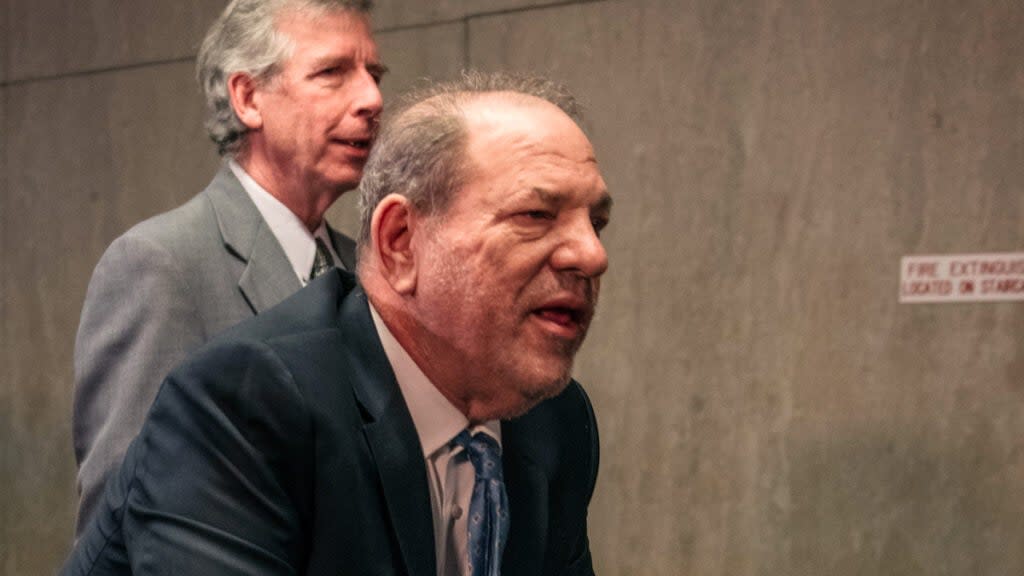Weinstein Trial Closing Arguments Begin: Prosecution Says Harvey Was a ‘Degenerate Rapist’

Closing arguments began Wednesday in the Los Angeles rape trial of Harvey Weinstein, capping more than a month of testimony that included eight women whose accusations of rape and sexual assault could be in the hands of the jury before the weekend.
Before prosecutors began their closing statement, the defense breezed through a few housecleaning witnesses on Wednesday, including a security worker named Christian Sheriff, who testified that there was a fire alarm at Mr. C’s hotel the night Jane Doe 1 testified Weinstein tracked her down in her room and raped her.
Another witness was FBI special agent Mike Easter, a cell-phone positioning expert who testified about a text message a Jane Doe witness sent from the Venice area to Weinstein associate Claudia Salinas. It was assumed that defense attorney Mark Werksman would clarify the reason for Wednesday’s witnesses in his closing statement.
Deputy District Attorney Marlene Martinez handled closing argument duties for the prosecution in the afternoon session, calling Weistein a “titan” who used his power “to prey on women. To silence women. He used that power to live his life without the repercussions of his predatory behavior. There is no question that Harvey Weinstein was a predator,” she said, showing an image of a wolf in the snow.
“For this predator, hotels were his trap. Confined within those walls victims were not able to run from his hulking mass. People were not able to hear their screams, they were not able to see them cower.”
Also Read:
Harvey Weinstein Won’t Testify in Rape Trial, Which Could Go to Jury This Week
She summarized the testimony of several of the eight witnesses, pulling together common threads of Weinstein’s m.o.: luring women with business meetings, bait-and-switching them into his hotel rooms, and assaulting them.
“These are eight women who do not know each other. They’ve never even met. Yet they all describe the same conduct by the same man,” she said.
Martinez notes that Weinstein’s tactics included using women – executive assistants and other female associates, like Claudia Salinas, accused of wrangling one accuser into a bathroom assault – to make his victims feel comfortable and let their guard down.
“No matter how much Ms. Salinas tried to deny remembering anything, she tried to deny remembering the assault, the aftermath of the assault, the truth is she knows what happened. She was there,” Martinez said. Salinas took the stand and denied the allegation.
And finally, Martinez said, Weinstein tried to “cover his tracks” with party invites, auditions for roles, and other interactions to try to make it seem later like the encounters were consensual. She tried to get ahead of the defense argument that the women – including Jennifer Siebel Newsom, wife of California Gov. Gavin Newsom – were seeking career advantages, or at least knew what they were getting into.
“In 2005, who would have thought that the most powerful man in Hollywood was a closet rapist?” Martinez said. “Who could blame [Newsom] for thinking that she could handle herself?”
“He was relentless,” Martinez said of the alleged Newsom assault. “He switches his tactics up. After being aggressive and chasing her around the room … he changed it up. He softened his approach … breaking down her walls.”
Also Read:
Mistrial Declared in Danny Masterson Rape Case, ‘That ’70s Show’ Star Still May Face New Trial
And finally, Martinez recast the alleged victims’ continued contact with Weinstein as an act of strength – considering the stakes of crossing one of the most powerful men in Hollywood.
“Getting on the defendant’s bad side? That would guarantee your career is over,” Martinez said. “These women had so many dreams that they were not going to let this monster destroy them.”
Court was expected to resume Thursday morning.
Weinstein is already serving 23 years in a New York prison for criminal first-degree sexual assault and third-degree rape, a conviction he has been granted the right to appeal. He has maintained his innocence since the New York Times first published accusations against him five years ago.
Prosecutors originally brought 11 counts based on the accusations of eight women; however, Jane Doe 5 never materialized and without her testimony, four of the charges were dropped. Weinstein could still face up to 140 years in a California prison from the remaining five counts of sexual assault and two counts of rape.